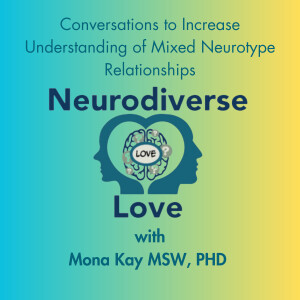
Neurodiverse Love with Mona Kay
Society & Culture:Relationships

Differences in Executive Functioning and Emotional Fluency through Word Pictures with Enoch-Part 2
 2024-01-23
2024-01-23
Download
Right click and do "save link as"
If you would like to join the "mixed neurotype" support group that I co-facilitate with Jodi Carlton called "Navigating Your Neurodiverse Relationship" you can register at: https://jodicarlton.com/groups/
The cost is ONLY $25 per session and we offer 2 groups (12:30-2PM EST and 6:30-8pm EST) and they both meet on the 1st Wednesday of each month.
In addition, if you would like to order the digital version of the Neurodiverse Love Conversation Cards ($11) or the Neurodiverse Love Conversation Card Workbook ($12.97) go to www.neurodiverselove.com
Thank you for being part of the Neurodiverse Love community!
_______________________________________________________
Enoch is back for "Part 2" of our conversation together so that he can share a few more of the word pictures he developed. Each of these were created to provide more depth about what he experienced in his neurodiverse marriage and what he has heard others describe about their relationship.
The word pictures discussed are:
CPU's single threaded vs multi-threaded-this word picture addresses executive functioning and the effect it can have on "time awareness"; the ability to handle multiple realities at the same time (theory of mind); the importance of a "hypervisor" to conduct the different streams; and process sensory inputs (non-verbal communication).
The 5 A's: acknowledge treasures; anticipate needs; accommodate; appreciate; and adore.
Monochrome vs Color (emotional fluency differences and the ability to perceive and react in real time and not through a cognitive algorithmic analysis)-when one partner experiences things through contract and the other through nuance and intensity. When partners show and/or talk about their feelings in different ways (verbal and/or non-verbal).
The Funny Car-is usually found on a drag race strip and excels at what it does. When the car is purchased and it is taken off the track it has trouble managing traffic, braking, and turning sharp corners.
Enoch ends the episode with some important questions for the non-autistic/NT partner to consider:
1) Where on the "spectrum" does the NT find themselves between a partner and a caregiver?
2) What are reasonable expectations that an NT may have?
3) Are there enough positives to sustain a relationship that may be lacking in some types of reciprocity and partnership?
To learn more about Enoch and the resources he has collected on neurodiverse relationships and neurodiversity, you can check out his website at: www.Ifgodwhy/ND or email him at: ifgodwhy@gmail.com
---
Support this podcast: https://podcasters.spotify.com/pod/show/neurodiverse-love/support
view more
More Episodes
012345678910111213141516171819
Create your
podcast in
minutes
- Full-featured podcast site
- Unlimited storage and bandwidth
- Comprehensive podcast stats
- Distribute to Apple Podcasts, Spotify, and more
- Make money with your podcast
It is Free
- Privacy Policy
- Cookie Policy
- Terms of Use
- Consent Preferences
- Copyright © 2015-2024 Podbean.com





